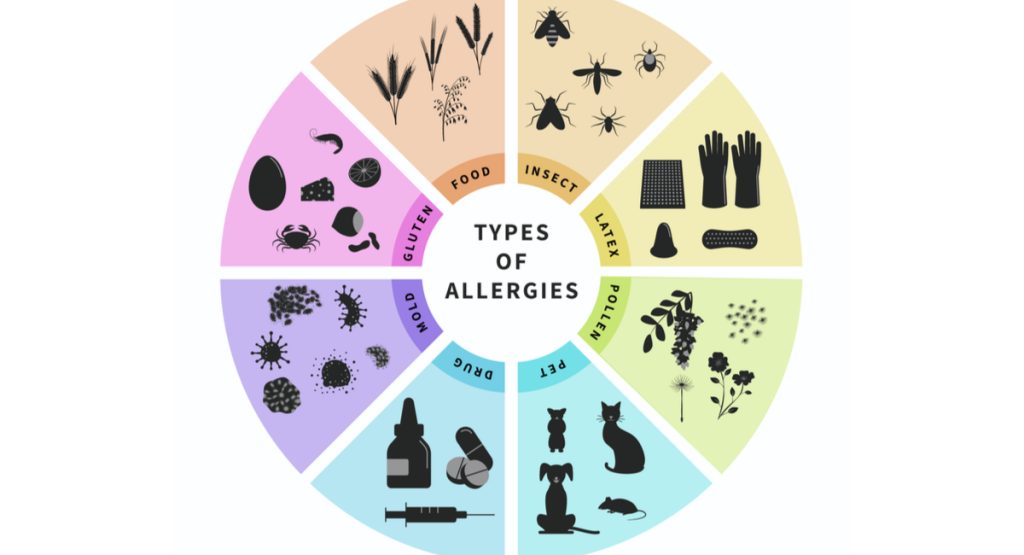Experience natural relief with Ayurvedic allergy treatment in Kerala. Discover holistic solutions rooted in ancient wisdom to alleviate allergies. Start your journey to wellness today with Samwarthika Ayurveda Hospital
Allergies result from an exaggerated response by the body’s immune system to specific substances that it incorrectly perceives as harmful. This excessive immune reaction is termed an allergic response, with the substances responsible for triggering it being referred to as allergens. Allergic reactions often manifest as common skin and respiratory conditions like eczema, hives, hay fever, asthma, and food allergies. According to Ayurveda, allergies are viewed as a consequence of impaired digestion, which can manifest as preliminary symptoms like indigestion, constipation, or diarrhea. This digestive dysfunction leads to heightened sensitivity to particular substances, such as dust and pollen, which act as triggers for allergic episodes. The accumulation of ama, essentially toxins in the form of mucus, in the respiratory tract and lungs obstructs normal breathing and results in symptoms like wheezing, coughing, or sneezing.
In Ayurveda, the treatment of allergies begins with a comprehensive diagnosis to identify the specific underlying causes in each individual. Ayurvedic detoxification procedures are then employed to address the root cause of the allergic response. These procedures not only assist in rebalancing Agni (digestive fire), but also facilitate the removal of excess Dosha from the body, ultimately strengthening the immune system.
Ayurveda attributes the primary cause of allergies to the accumulation of toxins in the body. This accumulation often results from poor digestion and a weakened immune system, which, in turn, can exacerbate the levels of Kapha in the body and increase susceptibility to various allergens.

Let’s delve into the three types of allergies as identified in Ancient Ayurvedic wisdom:
1. Vata-Type Allergies: Vata-type allergies typically manifest in the digestive tract and exhibit symptoms such as burping, gastrointestinal discomfort, gurgling intestines, abdominal pain, wheezing, headaches, sneezing, sciatica, muscle spasms, and other Vata-related discomforts. Imbalances in Vata can lead to food sensitivities, particularly to raw foods, various beans (like black beans and pinto beans), and some animal proteins, such as pork. To balance Vata, it is crucial to slow down, maintain warmth, stay hydrated, and adopt a diet that pacifies Vata. Consuming ginger or licorice teas with a drop of ghee can often alleviate Vata-type allergies. An effective therapy for addressing these allergies involves Dashamula tea enemas.
2. Pitta-Type Allergies: Pitta-type allergies typically occur when the allergen comes into contact with the skin and gradually enters the bloodstream. These allergies are often characterized by skin-related reactions like itching, allergic dermatitis, eczema, rashes, and may also involve bloodshot eyes. Pitta allergies can also lead to heartburn, acid indigestion, stomach issues, nausea, or vomiting. Food sensitivities with Pitta allergies may include hot and spicy dishes, citrus fruits, tomatoes, and fermented foods. To balance Pitta, adopting a Pitta-pacifying diet is advisable. Natural formulas that support the blood, like a combination of Manjistha and Neem, can be beneficial for Pitta-type allergies.
3. Kapha-Type Allergies: Kapha-type allergies are often triggered by pollen-based allergens and result in symptoms like irritation of the mucous membranes, hay fever, colds, congestion, sinus infections, bronchial congestion, asthma, and sleep disturbances. Food sensitivities with Kapha allergies may include dairy products like milk, yogurt, or cheese. Balancing Kapha involves keeping warm and dry, staying active, and following a Kapha-friendly diet. Clarifying teas like ginger, cinnamon, and cardamom can help eliminate excess Kapha. Using local honey as a sweetener aids in cleansing the system. Additionally, Trikatu, in tablet form, can offer support, and Punarnava effectively clears excess Kapha from the chest and stomach, promoting proper fluid balance in the tissues. Panchakarma is another highly effective method for removing accumulated Kapha from the system.

Here are some useful Ayurvedic approaches to manage allergies:
Use a Neti pot with a mild saline solution and distilled water to reduce Kapha’s heaviness and remove allergens from mucous membranes.
Practice Nasya by applying a bit of sesame oil with eucalyptus or camphor in each nostril about an hour after using the Neti pot.
Take Trikatu before meals to enhance Agni (digestive fire).
Avoid cold foods and drinks, including dairy, wheat, meat, and iced beverages, as they can slow down digestion and dampen Agni.
Opt for warm, light, natural, cooked foods that are easy to digest, focusing on fresh, organic vegetables and fruits cooked with a bit of ghee or olive oil.
Incorporate ginger tea throughout the day to support digestion.
Take Triphala tablets at night to help eliminate excess toxins and promote efficient digestion.
Engage in daily exercise to stimulate Agni and eliminate Ama.
At Samwarthika Ayurveda Hospital, our approach centers on harmonizing the three doshas within the body and enhancing the patient’s immunity. Our Ayurvedic allergy treatment in Kerala are tailored to the individual and involve techniques such as clearing the sinuses through Nasya treatment and Vamana Panchakarma procedures to address the relevant dosha imbalances and facilitate detoxification. Ayurvedic herbal decoctions are administered to promote healthy digestion, accompanied by dietary and lifestyle adjustments aimed at bolstering the immune system. All our Ayurvedic medications are formulated using organic herbal ingredients to ensure excellent results. Patients also receive guidance on specific diet plans designed for lasting benefits, which may include avoiding fried and spicy foods, fermented items, and limiting the consumption of tea and coffee. Our Ayurvedic treatments are dedicated to enhancing both immunity and the respiratory system. Engaging in gentle physical activities or yoga asanas is encouraged to improve the breathing process and rejuvenate the body and mind.
At Samwarthika, we offer safe and efficacious Ayurvedic herbal formulations and personalized treatment strategies to effectively manage and recover from severe allergic conditions, all while minimizing the risk of side effects. For further information regarding our treatment plans for allergic rhinitis and associated costs, we invite you to schedule an appointment with us today.
Dealing with allergies can be quite uncomfortable, especially for those who already struggle with them. So, what exactly are allergies? According to Ayurveda, allergies occur when allergens aggravate one of the specific Doshas: Vata, Pitta, or Kapha. Ayurveda categorizes allergies based on which Dosha is triggered in each case. Individuals with a predominant Pitta Dosha are likely to experience Pitta-type allergies, while those with a dominant Kapha Dosha may suffer from Kapha-related allergies.
At Samwarthika Ayurveda Hospital, we offer treatments for various ailments. Ayurveda, as an ancient system of medicine, promotes natural and holistic healing. Its benefits extend beyond relief and aim to customize treatments by integrating age-old traditions into daily routines (Dinacharya) and seasonal routines (Ritucharya) to cure and prevent the recurrence of illnesses. To learn more about Ayurveda and its beneficial treatments, please visit www.samwarthika.com.
Frequently Asked Questions
What is the main cause of Allergy?
Some of the common factors that contribute to allergies include:
Allergies: Reactions to allergens such as certain foods, molds, dust, pollen, and pets can trigger asthma and allergic responses.
Family History: A family history of allergic disorders can increase the likelihood of developing asthma or allergies.
Air Pollution: Exposure to environmental pollutants like smoke, smog, and asbestos can exacerbate asthma and allergy symptoms.
Unhealthy Habits: Engaging in detrimental habits like cigarette smoking, or exposure to second-hand smoke, along with poor dietary choices, can worsen asthma and allergy conditions.
Occupational Factors: Some jobs or working conditions that involve exposure to gases, fumes, industrial chemicals, textiles, and woodwork may lead to the development or worsening of asthma and allergies.
Early Childhood Illness: Viral respiratory infections during childhood, such as colds and flu, can contribute to the development of asthma.
Hay Fever: Hay fever, which is caused by an allergic reaction to pollen, is closely linked to asthma and can exacerbate its symptoms.
It’s crucial for individuals with asthma and allergies to identify and manage their triggers to effectively control their symptoms and lead a healthier life. Consulting with healthcare professionals and adopting strategies to minimize exposure to these triggers can significantly improve their quality of life and reduce the impact of these conditions.
Can Ayurveda Treat Allergies?
Ayurveda indeed approaches allergies from a holistic perspective, focusing on the balance of doshas or bio-energetic principles within the body and mind. In Ayurvedic philosophy, allergies are seen as a manifestation of an underlying dosha imbalance, and the goal of treatment is to address this root cause rather than merely alleviating symptoms. This approach aligns with Ayurveda’s core principle of personalized and holistic healing.

